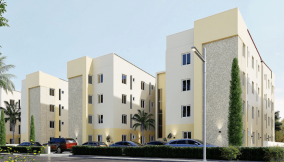Experts, professionals and sundry stakeholders in the Nigerian property market have explained why properties, especially land and housing, are getting more expensive, citing Lagos as a leading example of cities in the country where this is happening.
The foremost reasons, according to the experts, are naira’s fluctuation and rising inflation. Ayo Ibaru, chief executive officer of Lagos-based Northcourt Real Estate, explained that input material prices were one of the first to reflect the exchange rate crisis that led to the price increase last year.
Ibaru’s views were contained in his keynote address at an event hosted by the Royal Insitute of Chartered Surveyors (RICS), Nigeria Group in Lagos, looking at ‘2025 Nigeria Real Estate Market Outlook’ in Lagos’.
Read also: Properties turn rubbles as Lagos seeks to enhance mobility
“Property prices in Lagos Island have continued to increase, likely because of the high prices from property material construction, and also because there is a growing demand,” he said.
“They would come down a bit, but again, on average, material prices have gone up,” he added.
The Northcourt CEO said that while the exchange rate appears to be “getting stronger by the week” there are serious concerns about inflation that’s continued to erode purchasing power as data “suggest that we still have quite a bit of work to do.”
Speaking during the panel session, Funke Okubadejo, head, real estate at Actis West Africa, said investing in real estate can be viewed from the perspective of the risk and reward.
Okubadejo noted that to have a long term hold of real estate which she aptly described as “real estate high” building has to be well built and maintained so it transcends 35 years.
“When you want the return, the question is about what the objectives of the owners and the lenders are. It’s just to ensure that it meets the main features you want for real estate, which is inflation protection. And it provides a good long term yield for the investors,” Okubadejo said.
She explained that there is long term hold of real estate, there is the quick feed, which is the opportunistic end, adding that one of the challenges of real estate is the retention and allocation of local capital as against foreign.
Commenting on how inflation is dealing a blow on the economy and not sparing the real estate sector, Okubadejo said since the sector is not immune to rising prices, it’s important to “support the growth of the sector in the more institutional realm, both for investors as well as developers. And also it creates a lot of opportunities for different people.”
“Once there’s inflation, prices of everything will rise. And we’re just going through the phase. We’re still not in the same place when you consider things on a dollar basis. And so real estate obviously has a very important place in the market.”
In her contribution, Rolake Akinkugbe, anchor, Business Week on Arise TV said plans to end Nigeria’s over 98 million housing deficits may be impossible given the paltry allocation it got in the 2025 budget, urging the government to provide actionable policies that would improve the growth of the real estate sector.
“The allocation for the housing sector for urban development is actually about 0.18 percent. If you’re trying to build 550,000 units every year for the next 10 years, that is going to be a really tough task.
Read also: Rental properties seen dominating real estate market transactions in 2025
“So, in terms of how the government is positioning fiscal policy to help drive real estate development amidst all these global macro issues, I think we’re punching well below our weight and we need to do a lot more,” Akinkugbe said.
Speaking on how the proposed tax reforms which are set to take off in July will affect the real estate sector, Yomi Olugbenro, West Africa Tax Partner at Delloite, said the essence of the policy is to make “doing business in Nigeria easy”.
“If you’re investing in the real estate sector in Nigeria, you’re a developer, or you’re a financier, or you’re even a private developer, there’s some cost.
“The idea is how do we make the business environment a lot easier? How do we use tax as a tool to attract both local and foreign capital? That’s at the heart of what the reform is trying to do,” Olugbenro said.
Join BusinessDay whatsapp Channel, to stay up to date
Open In Whatsapp





